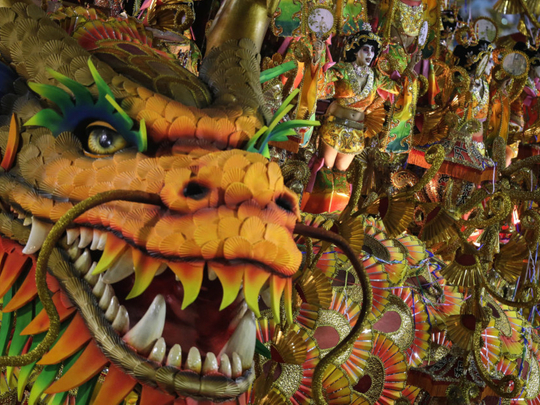
Last week, the keepers of the world’s biggest Carnival grabbed brooms and holy water and, in a ritual as old as Brazil, anointed the parade grounds.
When the pre-Lenten merriment kicked off in Rio de Janeiro’s Sambodromo last weekend, another ritual was also on display: The scrubbing of reputations.
Keep your eye on Monday night’s parade, where 12-time champion samba troupe Beija Flor will sing the glories of Equatorial Guinea.
Hailing Mother Africa is an honoured tradition in Brazil, home to the largest population of African descendants in the Americas. But by singing for Equatorial Guinea’s president Teodoro Obiang Nguema Mbasogo, a dictator with a soft spot for samba and a lapel full of human rights citations, Beija Flor has pushed the genre another octave.
So what is a few summary executions and tortured prisoners between friends? After all, it costs a bundle to deploy a 4,000- plus squad of dancers, drummers and a fleet of floats in a live show with Broadway production values.
Beija Flor, which received 10 million reais ($3.5 million) from Obiang, is only the latest samba school to mortgage its sequins for sponsorship.
Brazil’s modern Carnival was born in sin decades ago when the dons of an illegal numbers racket — the jogo do bicho, or animal game — decided to bankroll talent in the slums, where samba was born. The favelas got ostrich feathers and talking drums, while the bicheiros got laundered reputations. Throw in photo-ops with mayors and celebrities, and a perch on a five- storey float, and the spin cycle was complete.
As Nelson Motta, a writer specializing in popular music, told me: “The tradition in carnival is that money has no colour, no origin and no flag. People looked the other way.”
Perfect billboard for policy initiatives
But as the block parties swelled into show business, the scramble for sugar daddies became intense. Beer companies were the corporate pioneers, combining beverage sales with product placement at the Sambodromo, Ricardo Noblat reported in O Globo. Airlines, carmakers and steel mills followed.
It wasn’t long before government stepped in. Packed bleachers and a global television audience offered the perfect billboard for policy initiatives, no matter how dubious, on the taxpayer’s reais.
Foreigners quickly caught on: In 2006, Hugo Chavez sluiced some petrodollars to Vila Isabel in 2006 to hoof for the ambitious Bolivarian revolution and won the pageant. The theme song? ‘Soy Loco Por Ti, America’ — I’m crazy for you, America. Two years later, Portugal sprung for the bash, hiring four different samba schools to belt out sambas for the bicentennial of the monarchy’s arrival in Brazil. No one made fun of the emperor.
Carnival is grander for such largesse. Whether dancing for big money, never mind Big Men, has made the pageant better is another question. “Brazil has made a specialty of getting cozy with tyrants,” said Motta. “It makes the old carnival bicheiros look quaint.”
In fairness, Beija Flor’s composers scored and wrote their own samba, a soulful panegyric to the griot — the mythic storyteller-cum-philosopher figure venerated in much of West Africa. Just in case, though, Obiang vetted the lyrics.
— Washington Post
Mac Margolis is a Bloomberg View contributor based in Rio de Janeiro.











